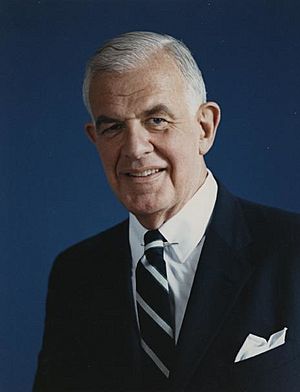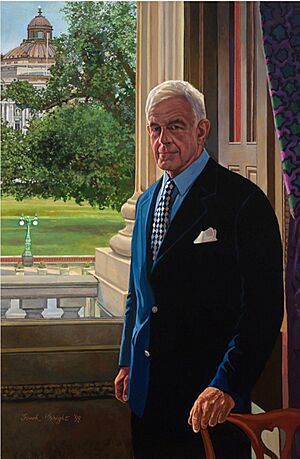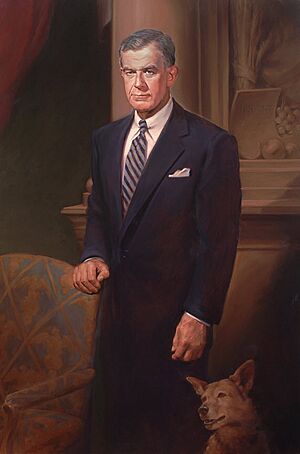Tom Foley facts for kids
Quick facts for kids
Tom Foley
|
|
|---|---|
 |
|
| 25th United States Ambassador to Japan | |
| In office November 19, 1997 – April 1, 2001 |
|
| President | Bill Clinton George W. Bush |
| Preceded by | Walter Mondale |
| Succeeded by | Howard Baker |
| Chair of the President's Intelligence Advisory Board | |
| In office January 16, 1996 – November 19, 1997 |
|
| President | Bill Clinton |
| Preceded by | Warren Rudman (acting) |
| Succeeded by | Warren Rudman |
| 49th Speaker of the United States House of Representatives | |
| In office June 6, 1989 – January 3, 1995 |
|
| Preceded by | Jim Wright |
| Succeeded by | Newt Gingrich |
| Leader of the House Democratic Caucus | |
| In office June 6, 1989 – January 3, 1995 |
|
| Preceded by | Jim Wright |
| Succeeded by | Dick Gephardt |
| House Majority Leader | |
| In office January 3, 1987 – June 6, 1989 |
|
| Speaker | Jim Wright |
| Preceded by | Jim Wright |
| Succeeded by | Dick Gephardt |
| House Majority Whip | |
| In office January 3, 1981 – January 3, 1987 |
|
| Leader | Tip O'Neill |
| Preceded by | John Brademas |
| Succeeded by | Tony Coelho |
| Chair of the House Agriculture Committee | |
| In office January 3, 1975 – January 3, 1981 |
|
| Preceded by | William Poage |
| Succeeded by | Kika de la Garza |
| Member of the U.S. House of Representatives from Washington's 5th district |
|
| In office January 3, 1965 – January 3, 1995 |
|
| Preceded by | Walt Horan |
| Succeeded by | George Nethercutt |
| Personal details | |
| Born |
Thomas Stephen Foley
March 6, 1929 Spokane, Washington, U.S. |
| Died | October 18, 2013 (aged 84) Washington, D.C., U.S. |
| Political party | Democratic |
| Spouse |
Heather Strachan
(m. 1968) |
| Education | Gonzaga University University of Washington (BA, JD) |
Thomas Stephen Foley (born March 6, 1929 – died October 18, 2013) was an American lawyer and politician. He served as the 49th Speaker of the United States House of Representatives from 1989 to 1995. The Speaker is the leader of the U.S. House of Representatives, chosen by its members.
Foley was a member of the Democratic Party. He represented Washington state's fifth district in the House of Representatives for 30 years (1965–1995). He was the first Speaker of the House since 1862 to lose a re-election campaign.
Born in Spokane, Washington, Foley studied law at the University of Washington School of Law. He worked as a prosecutor and assistant attorney general before joining Senator Henry M. Jackson's staff. With Jackson's support, Foley was elected to the House of Representatives. He served as Majority Whip from 1981 to 1987, and as Majority Leader from 1987 to 1989. After Speaker Jim Wright resigned, Foley became Speaker of the House.
Even though his district became more conservative, Foley won re-election many times. However, in the 1994 election, he lost to George Nethercutt. This happened partly because Foley was against term limits, which limit how long a politician can stay in office. After leaving the House, Foley served as the United States Ambassador to Japan from 1997 to 2001 under President Bill Clinton.
Contents
Early Life and Education
Thomas Stephen Foley was born and grew up in Spokane, Washington. His mother, Helen Marie, was a school teacher. His father, Ralph E. Foley, was a Superior Court judge for 34 years. His family had Irish Catholic roots.
Foley graduated from Gonzaga Preparatory School in Spokane in 1946. He then attended Gonzaga University for three years. He finished his bachelor's degree at the University of Washington in Seattle. In 1957, he earned his law degree from the University of Washington School of Law.
After law school, Foley worked as a private lawyer. In 1958, he became a deputy prosecutor in Spokane County. He also taught at Gonzaga's School of Law from 1958 to 1959. In 1961, he joined the state attorney general's office as an assistant. Later that year, Foley moved to Washington, D.C., to work for Senator Henry M. Jackson. He left this job in 1964 to run for Congress.
Time in Congress
In 1964, Foley ran for Washington's 5th congressional seat. He won against the 11-term Republican Congressman Walt Horan. This was part of a big win for Democrats in the 1964 elections. He was re-elected easily until 1978. After that, his district became more conservative, but he still won until 1994.
Foley supported important laws like the Voting Rights Act of 1965 and the Civil Rights Act of 1968. He also voted for the bill that made Martin Luther King Jr. Day a federal holiday.
During his first term, Foley joined the Agriculture Committee. He became its chairman in 1975. In 1981, Foley was chosen as the House Majority Whip. This role involves making sure party members vote together. Six years later, in January 1987, he was elected House Majority Leader. This meant he was the second-highest ranking Democrat in the House.
Speaker of the House
In June 1989, Jim Wright of Texas resigned as Speaker of the House. Foley was then elected as the new Speaker on June 6, 1989. He received 251 votes.
As Speaker, Foley led the House through many important laws. These included:
- An update to the Clean Air Act to protect the environment.
- The Americans with Disabilities Act of 1990, which protects people with disabilities.
- The Individuals with Disabilities Education Act, which helps students with disabilities.
- The Budget Enforcement Act of 1990, which created a "pay-as-you-go" rule for government spending. This rule means new spending must be paid for by cuts elsewhere or new taxes.
- The Omnibus Budget Reconciliation Act of 1993, which helped balance the federal budget.
- The Family and Medical Leave Act of 1993, allowing workers to take time off for family or medical reasons.
- The North American Free Trade Agreement Implementation Act (NAFTA), which created a trade agreement between the U.S., Canada, and Mexico.
- The Brady Handgun Violence Prevention Act, which required background checks for gun purchases.
As of 2023, Tom Foley is the most recent Democrat other than Nancy Pelosi to serve as Speaker of the House.
Term Limits and Re-election
During his time in the House, Foley was against efforts to limit how many terms elected officials could serve. In 1991, voters in Washington state rejected term limits, supporting Foley's view. However, in 1992, a new term limit plan was approved by voters.
Foley went to court, arguing that states could not limit the terms of federal officeholders. He won his case, with a U.S. District Court agreeing that states did not have this power under the U.S. Constitution.
However, in 1994, when Foley ran for his 16th term, his Republican opponent, George Nethercutt, used this issue against him. Nethercutt pointed out that the court case was called "Foley against the People of the State of Washington." Nethercutt promised to serve no more than three terms if elected (though he ended up serving five). Foley lost the election by a small number of votes.
Foley became the first sitting Speaker of the House to lose a re-election campaign since 1862. Some people believe his stance on term limits contributed to his defeat. President Clinton also thought Foley's support for the 1994 Federal Assault Weapons Ban played a role.
Later Career
From 1995 to 1998, Foley led the Federal City Council. This group focuses on economic growth in Washington, D.C.
In 1997, President Bill Clinton appointed Foley as the 25th U.S. Ambassador to Japan. He served in this role until 2001. During his time as ambassador, he was involved in the U.S. government's response to the deaths of Japanese schoolchildren caused by a U.S. submarine.
Foley was a delegate for Washington state at the 2004 and 2012 Democratic National Conventions. In 2003, Governor Gary Locke gave Foley the Washington Medal of Merit, the state's highest honor. He also served as the North American Chairman of the Trilateral Commission.
Death
Tom Foley passed away at his home in Washington, D.C., on October 18, 2013. He was 84 years old and had been receiving hospice care after suffering strokes and pneumonia. He was survived by his wife, Heather.
Many leaders honored Foley after his death. Speaker John Boehner and former Speaker Nancy Pelosi issued statements. President Barack Obama called Foley a "legend of the United States Congress" who served with "skill, dedication, and a deep commitment." Vice President Joe Biden and Washington Governor Jay Inslee also shared their tributes. Former President George H. W. Bush said Foley "represented the very best in public service."
Honors
- Honorary Knight Commander of the Order of the British Empire (UK).
- Order of Merit (Germany).
- Légion d'honneur (France).
- Order of the Rising Sun with Paulownia Flowers, Grand Cordon (Japan), 1995.
- Thomas S. Foley Institute for Public Policy and Public Service at Washington State University, Pullman. Established in 1995.
- Thomas S. Foley Memorial Highway (U.S. Route 395), dedicated in 2018.
Images for kids
See also
 In Spanish: Tom Foley para niños
In Spanish: Tom Foley para niños
 | George Robert Carruthers |
 | Patricia Bath |
 | Jan Ernst Matzeliger |
 | Alexander Miles |




